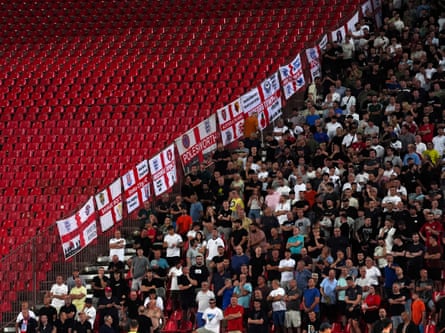England defeated Serbia in a World Cup qualifier amidst political unrest in the stands, with Morgan Rogers leading England’s charge while Serbian fans protested against their government, resulting in clashes with riot police.
In a night of stark contrasts at Belgrade's Rajko Mitic Stadium, England secured a dominant victory over Serbia in their World Cup qualifier, but the match was overshadowed by simmering political tensions in the stands. England's performance, spearheaded by a fearless Morgan Rogers, showcased their prowess on the field, while off the pitch, Serbian fans voiced their discontent with the nation's leadership, resulting in clashes with riot police.
The game itself was a clinical display by England, who all but confirmed their place at the World Cup with an expertly controlled away performance. Morgan Rogers was at the heart of England's attacking play, displaying strength, awareness, and touch that belied his years. Meanwhile, Thomas Tuchel seems to be finally finding his footing with the national team, molding them into a cohesive and tactically astute unit. England's display eased any bad feelings and all the feelings went as the aspirin of world football delivered again.
However, the atmosphere in the stadium was far from celebratory. Even before kickoff, there was a palpable sense of unease among the home crowd, stemming from recent protests against the Serbian government and its leader, Aleksandar Vucic. Chants of disapproval echoed around the stadium, with fans making their feelings known about the Progressive Party and what they believe is the suppression of free speech.
The tension reached a boiling point in the second half. Following England's third goal, scored by Ezri Konsa, Serbian fans erupted in a unified chant against President Vucic. Shortly after, riot police entered the section of the crowd where the loudest singing had been taking place, resulting in skirmishes and a mass exodus of fans from the stadium. The presence of black-shirted men, rumored to be spotters identifying those expressing dissent, further fueled the sense of oppression.
Despite the unsettling events in the stands, England remained focused on the task at hand. Rogers continued to torment the Serbian defense, creating chances for his teammates and showcasing his exceptional talent. England's second goal, a testament to their collective vision and teamwork, was a particular highlight. Noni Madueke's run, Elliot Anderson's quick pass, and Rogers's nonchalant flick to set up the chance showed the potential of this England side.

Thomas Tuchel praised his team's performance, highlighting their teamwork, hunger, and speed. Reece James has secured his place as right-back. The emergence of players like Anderson further bolstered England's midfield options, providing creativity and energy. It was a promising night for England, both on and off the pitch, as they demonstrated their ability to overcome adversity and maintain their focus amidst challenging circumstances.
The events in Belgrade served as a reminder of the power of sport to reflect and intersect with broader social and political issues. While England celebrated their victory and moved closer to World Cup qualification, the voices of dissent in the stands highlighted the ongoing struggles for democracy and freedom of expression in Serbia.
